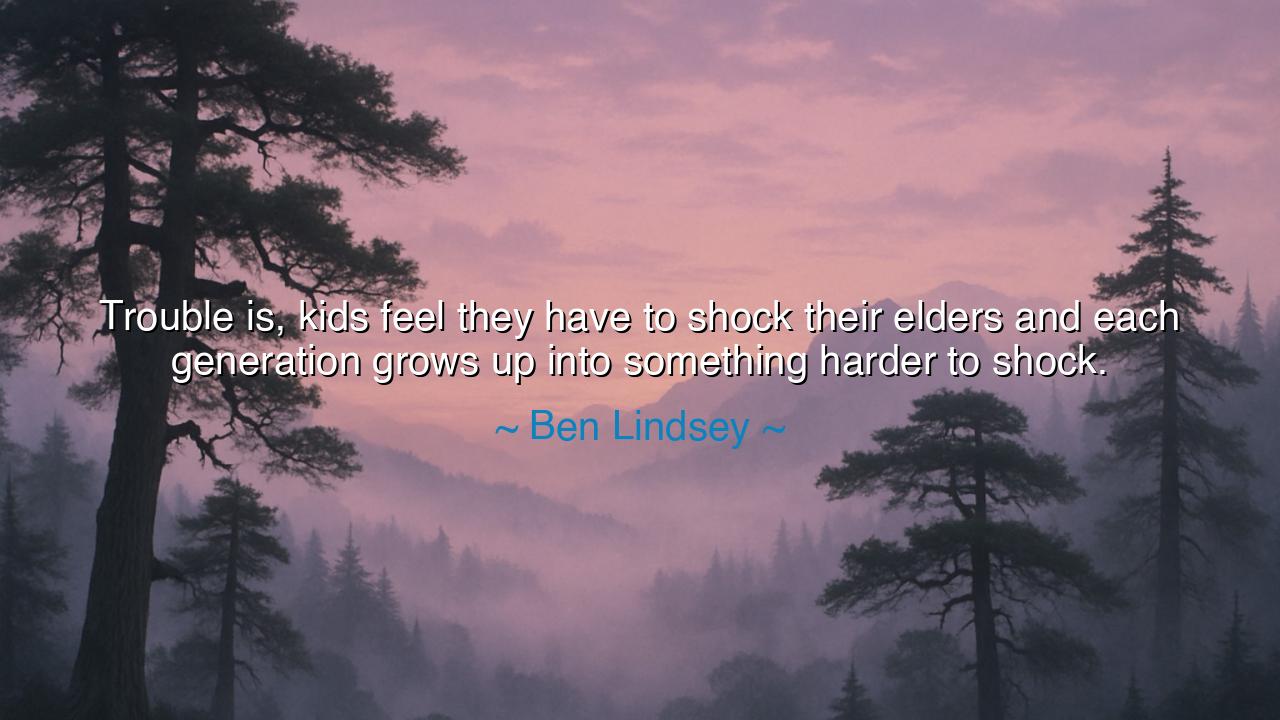
Trouble is, kids feel they have to shock their elders and each
Trouble is, kids feel they have to shock their elders and each generation grows up into something harder to shock.






Hearken, O seekers of understanding, and heed the words of Ben Lindsey, who casts his gaze upon the eternal struggle between youth and age: “Trouble is, kids feel they have to shock their elders and each generation grows up into something harder to shock.” Herein lies a meditation upon the dance of rebellion and expectation, a timeless reflection on the tension between innocence, audacity, and the wisdom of experience. Lindsey observes that the impulse to provoke, to astonish, and to challenge authority is as natural to youth as the rising sun, yet it is met with the steadying force of a world increasingly impervious to surprise.
The urge to shock elders springs from the youthful spirit’s desire for recognition, for autonomy, and for the assertion of identity against the weight of tradition. Adolescence is a crucible in which the soul tests boundaries, seeking to understand both the self and the limits of the world. Lindsey reminds us that this instinct is neither frivolous nor vain; it is a necessary rebellion, a rite by which youth measure their power and discern their place within the generations.
Yet each generation, growing under the influence of its predecessors, becomes harder to shock. Time, experience, and memory render the old familiar; acts once scandalous become ordinary, even mundane, and the very audacity that thrilled one age may leave the next unimpressed. Lindsey’s insight unveils the paradox of human maturation: the world continually shifts, yet the capacity for astonishment diminishes, leaving youth in perpetual pursuit of novelty and extremity.
Consider the tale of Socrates, whose unrelenting questioning shocked the elders of Athens, challenging assumptions of virtue, governance, and knowledge. While the youth of his city were inspired and invigorated, the seasoned minds of authority found themselves unsettled, even threatened. Lindsey’s observation mirrors this ancient dynamic: the impulse to confront and awaken through shock is as enduring as civilization itself, yet its impact wanes as the audiences grow accustomed to provocation.
The trouble Lindsey speaks of is not merely generational friction, but a deeper commentary on the evolution of culture and perception. As society accumulates knowledge, tolerance, and experience, the thresholds of surprise rise, and the innovations of youth are measured against the long arc of history. It is a reminder that rebellion and novelty must be guided by wisdom and intent, lest they become mere noise rather than illumination.
From this arises a lesson for all ages: recognize the impulse to provoke and challenge, yet temper it with understanding of context, timing, and consequence. Youth must channel their energy into meaningful expression, finding ways to stir thought, inspire courage, and illuminate truth, even when astonishment is no longer easily achieved. Likewise, elders must attend with openness, lest the wisdom of experience harden into rigidity, incapable of embracing new insight.
Practically, one may apply this wisdom by fostering dialogue across generations, encouraging the youthful urge to question, and guiding it toward constructive, creative, and transformative ends. Seek to balance audacity with reflection, courage with prudence, and novelty with purpose, so that the natural impulse to shock may serve the greater good rather than mere sensation.
Thus, let the words of Ben Lindsey endure: the interplay between youth and age, shock and familiarity, rebellion and wisdom, is eternal. Cherish the fiery spirit of youth, honor the tempered vision of elders, and recognize that each generation’s struggle to astonish is a sacred dance of growth, reflection, and understanding. In this recognition lies the path to harmony, insight, and enduring human connection.






AAdministratorAdministrator
Welcome, honored guests. Please leave a comment, we will respond soon